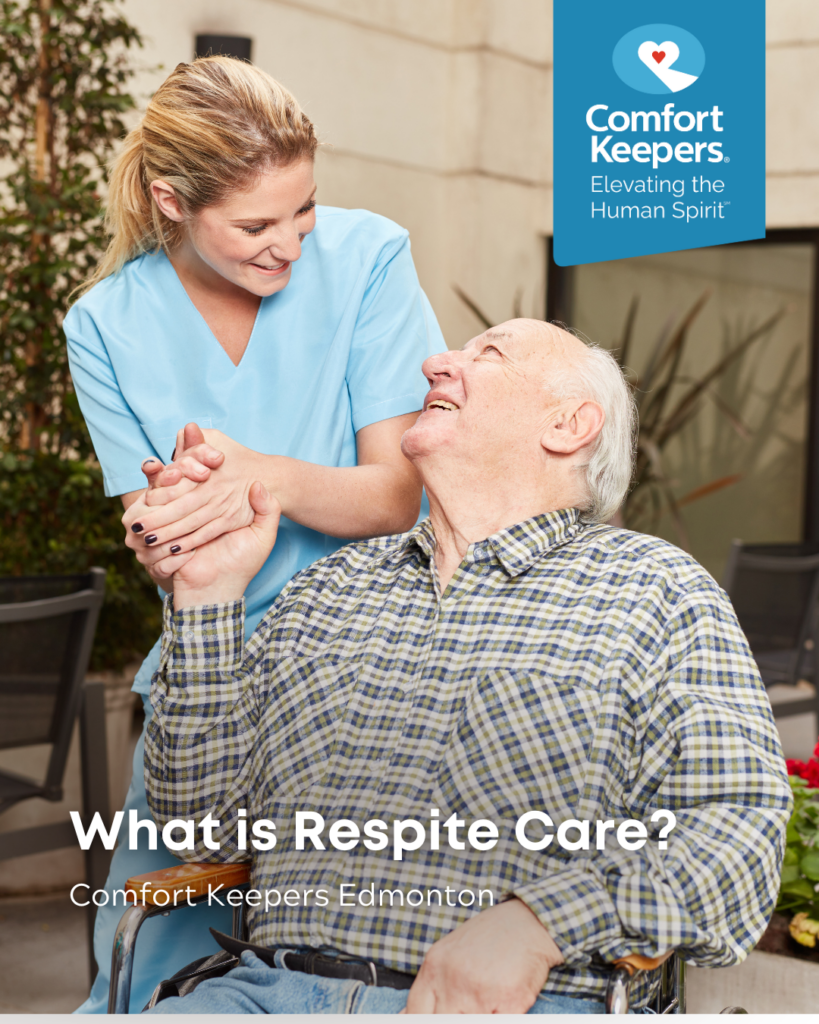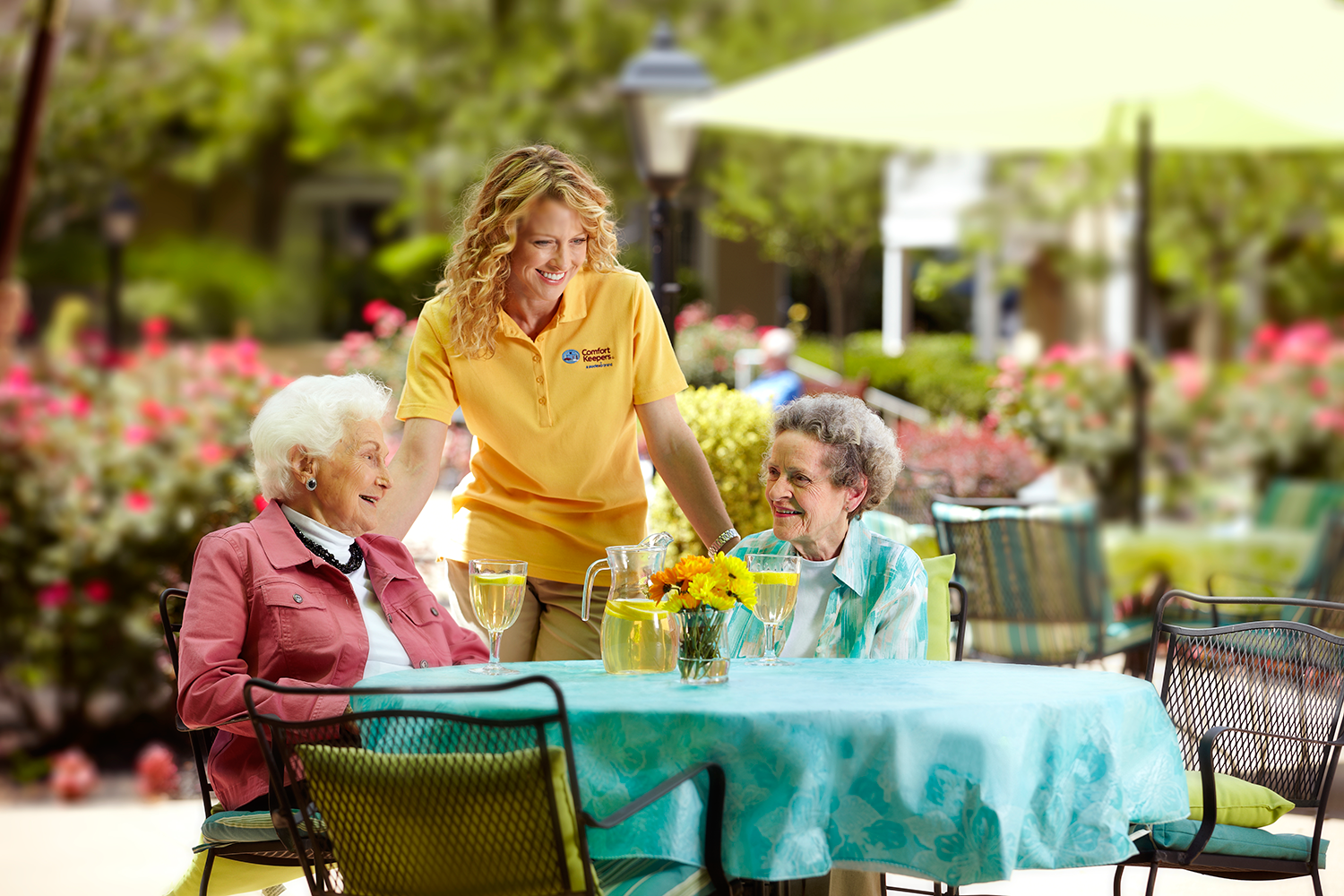What is Respite Care?
Senior Health | April 13, 2022

What Every Senior in Edmonton, AB, Needs to Know About Respite Care
What is respite care for seniors? Caring for a senior loved one is both rewarding and challenging. Family caregivers need to remember to take necessary breaks and practice self-care to ensure that they continue to find joy in their role.
According to CARP, more than 8 million Canadians provide unpaid care to family members or friends. Of those, more than 1 million caregivers are older than 65. The Centre for Disease Control reports that over half (53%) of caregivers indicated that a decline in their health compromises their ability to provide care.
The Family Caregiver Alliance (FCA) reports that 40 to 70 percent of caregivers exhibit clinically significant symptoms of depression.
What is Respite Care?
Respite care is the transfer of primary caregiving responsibilities to another person. Typically a professional caregiver, relative or friend substitutes for primary caregivers to provide temporary relief from caregiving responsibilities. Respite care takes many forms – some family caregivers choose to have someone take on caregiver duties for a few hours a week or a few hours a day. Or, some schedule respite care for longer periods to accommodate an extended break or vacation.
Respite Care and How It Affects the Family Caregiver
This can be particularly important for those caring for a senior who has a severe illness. A study led by the Stanford Center on Longevity and Stanford University Psychology Department, which was conducted with assistance from Comfort Keepers and Clear Care, found that for older family caregivers:
- Caring for a loved one with a mild illness generally leaves them in the same emotional state as their peers – with emotional well-being generally greater than that of younger adults.
- When responsible for a loved one with a severe illness, reported emotional well-being tended to be lower than those of their peers.
- The cause of a decrease in emotional well-being is attributed to the caregiver’s inability to pursue their social goals and friendships.
The purpose of this study was to help identify the unique challenges and stressors that family caregivers face. As a partner in this research study, we reached out to the family members and decision-makers of approximately 2,000 Comfort Keepers clients.
These results suggest that older people have higher emotional well-being than younger people but not when they have a relative with a severe illness. Not all older people with ailing relatives have low well-being; rather, it depends on the severity of the relative’s ailment.
Caregiver Fatigue and Respite Care
Caring for a senior loved one can be fulfilling and can strengthen bonds within a family. But it’s important to recognize that being a family caregiver can come with feelings of loss, stress and physical strain. Caregivers risk their health and well-being when they don’t account for their own needs or take a break when necessary, and respite care provides a convenient solution for many families.
Comfort Keepers® Edmonton is Proud to Offer a Wide Range of Home Senior Care Services
Our trained caregivers will ensure your loved one is comfortable, independent and safe in their home. On top of that, we will also aim to enhance their overall health, quality of life and general happiness.
Top-Notch Home Healthcare for Seniors in Edmonton, Alberta
Comfort Keepers of Edmonton offers a wider range of senior care services. We offer retirement care, respite care, senior care, companionship care, end-of-life care, post-surgery care, palliative care, personal care, and senior living transition services. If you are concerned about the health and well-being of your aging loved ones we can help with 24-hour care and more!
Helping Seniors Age-in-Place with Companionship Care and Interactive Caregiving™
Empathetic care starts in the heart and allows us to meet our client’s needs. Our trained caregivers are selected with one specific quality in mind, empathy. We strive to stimulate our clients emotionally, mentally and socially, thus enhancing their overall quality of life.
Our Interactive Caregiving™ provides a system of care that addresses companionship, safety, nutrition, mind, body, and activities of daily living (ADLs). The system increases seniors’ sense of well-being, independence and companionship by focusing on Senior Mind, Senior Body, Senior Nutrition, and Senior Safety.
Affordable and Client-Directed Homecare is Available for Qualifying Albertans
Comfort Keepers® Edmonton is an Approved Service Provider for the Client Directed Homecare Invoicing (CDHCI) Program Offered by Alberta Health Services.
What is the Client Directed Home Care Invoicing Program (CDHCI)?
CDHCI is a great program provided by Alberta Health Services (AHS), allowing clients to choose an approved agency like, Comfort Keepers Edmonton for Personal Care, Respite Care and Homemaking needs. The chosen agency can then bill AHS directly for services rendered for approved hours through Alberta Blue Cross. Read more about the program HERE.
Accredited Home Care Edmonton
Comfort Keepers® Edmonton was awarded the “Accredited with Exemplary Standing” seal by Accreditation Canada. This honour demonstrates Comfort Keepers’ commitment to offering safe, high-quality home care to its senior clients in Edmonton, AB.
To learn more about senior in-home care in Edmonton, contact the Comfort Keepers® office. Our service territory includes Edmonton, Devon, Sherwood Park, Stony Plain and surrounding areas, contact the Comfort Keepers Edmonton office at 780-465-4665.
References
CARP. “Caregiving by the Numbers.” Web.
Family Caregiver Alliance. “Policy and Advocacy.” Web.
Alzheimer’s Association. “Alzheimer’s and Dementia Caregiver Center: Respite Care.” Web. 2017
Stanford Center on Longevity. “Age and Emotional Well-Being: The Varied Emotional Experience of Family Caregivers” by Sarah Raposo, Jessica Barnes, Tamara Sims, Amy Yotopoulos, Lara Carstensen, Mary Bowman, Jacquelyn Kung. Web. 2017. Read more about the study here. https://www.comfortkeepers.com/family-caregiver-study
Individualized Home Care Options
Long-Term Home Care, 24 Hour Home Care & Short Term Care Options Customized for You







